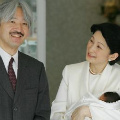Prince and Princess Akishino to Visit Austria and Bulgaria
On May 10, Prince and Princess Akishino are expected in Austria for a four-day visit. They are scheduled to visit there Klosterneuburg diocese, Vienna’s Schönbrunn Castle, the Neusiedler Lake National Park in the province of Burgenland as well as the Japanese school of Vienna and the capital’s Museum for Natural History.
Princess Akishino’s stay in the European country will probably remind the Japanese princess of happy times, as the former Kiko Kawashima attended elementary and high school in Austria when her father, Tatsuhiko Kawashima, became the chief researcher at The International Institute for Applied Systems Analysis (IIASA) in Laxenburg, near Vienna. Stemming from that time, the princess is fluent in German. That Princess Kiko, as she is informally called, has always kept in touch with some of her father’s old friends in Austria, Norbert and Gabriele Orac, became obvious to the public in summer 2006 when the couple invited her eldest daughter, Princess Mako, for a two-weeks stay at their home in the suburbs of Vienna.
Prince and Princess Akishino will continue their trip by departing for Bulgaria on May 13 where they will stay until May 16, in order to mark the 50th anniversary of the reinstatement of diplomatic relations between Bulgaria and Japan. The couple will also visit Hungary and Romania, as 2009 is proclaimed the year of friendship between Japan and the Danube states. In January, Bulgaria’s President, Georgi Parvanov, and his wife, Zorka Parvanova, paid an official visit to Japan. (Photo)
Prince Akishino (born 1965) is the second son of the current Japanese emperor, Akihito, and was for more than forty years the last male to be born into the imperial family. Prince Akishino’s elder brother, Crown Prince Naruhito, has one child, Princess Aiko, who under the current succession law that allows only males to ascend the throne cannot inherit after her father. Accordingly, after her birth in 2001, there were plans to revise the law and allow a woman to succeed the throne. Media surveys showed that about 80 percent of Japanese were supportive of these plans.
The upcoming changes were, however, stopped in their tracks when Princess Akishino became known to be pregnant for the third time. (The couple had already two daughters, Mako, born 1991, and Kako, born 1994.) The news was made public unusually early, when the princess was only six weeks pregnant, just days before the then-prime minister, Junichiro Koizumi, was due to introduce the bill to allow female succession in Parliament. (Normally, imperial pregnancies are not announced before the third month as the probability of a miscarriage is considerably reduced after that time.) The debate was put on hold, and after a stressful pregnancy (Princess Kiko had to be hospitalised several weeks before giving birth, because of placenta previa) and by a Caesarean section that had become necessary due to the complications, the princess gave birth to a healthy baby boy on September 6, 2006. In consequence, the little prince’s father, Prince Akishino, will now stay second in line to the Japanese throne. (In case of a revision of the succession law, this position would have been taken by Princess Aiko.) Little Prince Hisahito will follow after his father.
At first sight, by the birth of this little boy the Japanese succession crisis seems to have come to an end. But there are still problems left unsolved, among them the obvious risks that, God forbid, something might happen to Prince Hisahito, that he might insist on marrying a divorced or non-Japanese or otherwise unacceptable woman or that, even satisfactorily married, he might never have children of his own. Although all this may be reckoned improbable, it is, as the history of the imperial family (and other royal families worldwide) shows, absolutely within the range of possibility. Also, it would have to be considered that, when Prince Hisahito reaches maturity, his sisters and all of his cousins, including Aiko, will probably have left the imperial household, will have married and disappeared into commoner life. Most of the elders in the family will have died, leaving just him and his future spouse to fulfil the imperial duties that, at present, keep the whole imperial family busy…
Accordingly, in a comment on occasion of the golden wedding anniversary of Emperor Akihito and Empress Michiko, the newspaper Mainichi Shimbun remarked that, although the imperial couple overcame many challenges during 50 years of marriage, one still remains: to address the issue of imperial succession and to bravely allow a frank debate on this controversial matter.
Filed under JapanTagged Austria, Bulgaria, Official Visit, Prince Akishino of Japan, Prince Hisahito of Akishino, Princess Kiko of Japan, Succession.









Leave a Reply